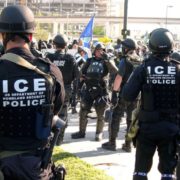MORE than 100 people with prior criminal convictions may face deportation after Immigration and Customs Enforcement (ICE) officers performed a sweep of arrests in Southern California between Monday, July 18 and Thursday, July 21.
ICE agents moved quickly to apprehend a list of 112 recently released inmates because a California law prevents police from holding them past the end of their sentences for immigration authorities.
However, California law enforcement agencies are permitted to hand those guilty of felonies over to ICE without releasing them, and many police departments notify federal agents when a non-citizen convicted of a crime leaves custody.
“Hopefully, we get there in time,” David Marin, the Deputy Field Office Director for ICE’s office in Southern California, told the Press-Enterprise. “Every single one of these persons came here legally or illegally, and they committed a crime.”
The targets of the ICE sweep were either associated with gang activity, had multiple misdemeanor convictions, or were found guilty of at least one serious misdemeanor like a DUI, according to the Los Angeles Times.
The criminal records of some of those arrested list convictions for burglary, sexual offenses against minors, assault with a deadly weapon, and at least one instance of attempted murder against a peace officer.
“What keeps me up at night, other than keeping these officers safe, is that we will not be able to get to these individuals in time,” said Marin. “Is that person going to commit some other crime?”
ICE agents arrested 56 people in Los Angeles County, 16 in San Bernardino and 13 in Orange County. The remaining 27 arrests took place in Riverside, Ventura, and Santa Barbara counties.
Only one individual arrested during the sweep came from the Philippines. The other convicts had migrated from Mexico, El Salvador, Guatemala, Belize, Honduras, Egypt, Tonga, Azerbaijan and the UK.
Those arrested who have pending deportation orders will be sent to their home countries immediately, while the rest will have to make their cases before an immigration judge.






